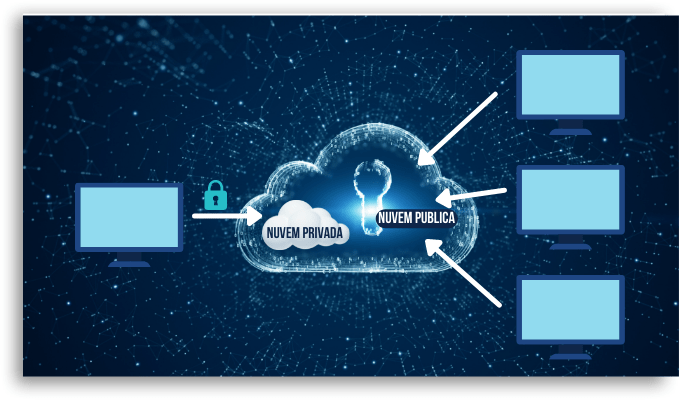Why use a virtual private cloud?
Have you ever heard of the virtual private cloud? This service, also known as VPC, isolates your data from the data of other companies, all this through the storage of your public cloud that is carried out within a private cloud.

Little known among the general public, this system is capable of bringing exclusivity, customization, and performance to a corporate system. It allows users to run applications and store data within a private, secure environment.
This is one of the fastest-growing cloud computing technologies today!
In the past, private service was sought for the protection and security of data, but with the advancement of security technologies, many companies and users, aiming at the economy, are migrating back to free cloud services. They work like a premium package for your favorite app, where you have access to different benefits from standard users.
Corporations such as Amazon (AWS), Microsoft (Azure), and Google (Google Cloud) rent environments within their data centers, perfectly capable of running and keeping private applications running and their respective data available.
If you are interested in the subject, come with us in this article and we will show you the details. Starting with the differences between the VPC and the free cloud, then explaining how it works, and, finally, why use a virtual private cloud.
So let’s go!
1. What is a virtual private cloud?
First of all, we need to understand what a virtual private cloud is and how it differs from a free cloud.
Widely used for personal use, the most common model of cloud computing in the public cloud. In it you hire the resources of a provider, sharing the infrastructure with all customers.
Let’s imagine that you are going on vacation and decide to go to a hostel. A free cloud is your shared room, shared with other people, while a VPC would be the purchase of a single room inside the hostel. You would have access to the same resources as other guests, but with a private space and with greater security, in a space that is yours alone.
Just like the contracting of premium services in applications, this model of the acquisition of virtual private clouds has been gaining supporters due to the variety of benefits offered.
You, or your company, do not need an IT infrastructure or frequent system maintenance, for example. In addition, the VPC window allows queries and changes in a very simplified way.
And it is exactly about this functioning that we will talk about better in the item below.
2. How does a VPC work?
A virtual private cloud offers almost the same use as the free model, with the difference that it has an infrastructure created and dedicated to the needs of the company. However, these features don’t mix with the rest of the public cloud.
The cloud computing vendor utilizes multiple virtual and physical mechanisms to ensure complete isolation of logical instances, ensuring greater data control.
There are two cloud service models that can be used:
- Platform as a Service (PaaS): allows the company to have a unique environment to manage from simple cloud-based applications to sophisticated enterprise applications, as well as to develop and monitor the company’s system;
- Infrastructure as a service (IaaS): when, in addition to the virtualization of systems and software, the storage and computing itself are provided remotely by the provider company.
In short, the private cloud is a widely used solution for businesses looking for more control and customization in their system.
3. Benefits of hiring a virtual private cloud
Now that we understand a little better the structure of how a VCP works, it’s time to get to know the reasons for hiring a virtual private cloud:
- Increased security: with monitoring created exclusively for your network, VPC allows you to protect your environment including your IP address, subnets, and network gateways, minimizing breaches and possible intrusion attempts, giving the IT react in time to avoid compromises.
- Improved performance: You can prioritize network traffic from specific applications to optimize their performance, helping to eliminate congestion and potential bottlenecks.
- Data control: With your VPC isolated from other clouds, you can control your data and prevent it from getting mixed up with data from other entities, a possible risk in public clouds.
- On-demand flexibility: This allows you to design the cloud architecture that works best for you.
or meets your business needs, ensuring maximum efficiency and productivity. - Scalability: your company gains more production capacity without increasing the volume of operation.
- Investment savings: the lower the investment in infrastructure, the less the company’s capital will be idle. Plus, updates and maintenance are up to the partner, and your IT team just needs to worry about implementation and management.
- Resource savings: in addition to saving on investments, reducing physical spaces to run the entire system also frees up space for other departments and can generate savings in resources, such as electricity.
4. Are there any downsides?
With the exception of the investment values, which are higher than in contracting the public cloud, it is difficult to point out disadvantages in a private cloud.
But it is important to emphasize that they can exist and will arise throughout the company management process. Enabling professionals to deal with the new structures and offer support during the migration is part of the investment in the company’s productivity.
Communication and investments need to go hand in hand to extract the maximum potential of both.
In summary, the private cloud brings all the characteristics of cloud computing, but without sharing the space with other customers.
Thinking about investing in a virtual private cloud?
Why don’t you tell us what you thought about the article, and if you would like to get know more tools like this, why don’t you check out this article about how to use Google Workspace for digital marketing, or maybe check these most profitable Instagram niches!





